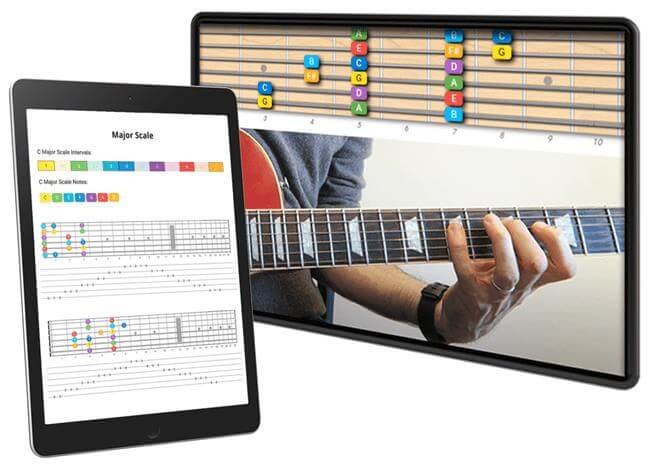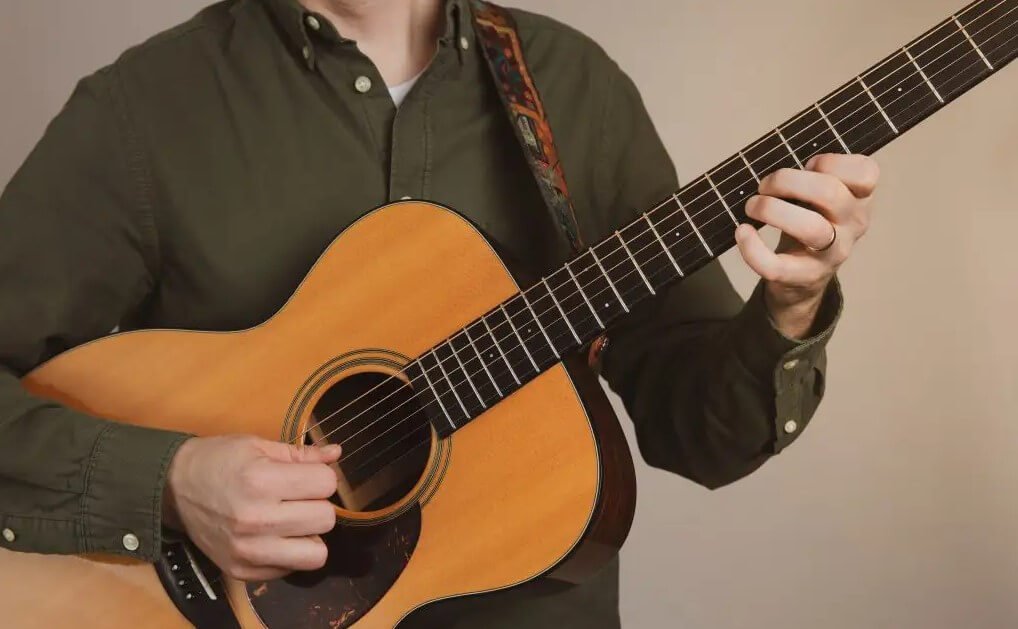Learning to play the guitar can be a rewarding journey, allowing you to express yourself through music and connect with others. If you’re eager to start learning this versatile instrument but unsure where to begin, fear not! In this article, we’ll guide you through the process of learning guitar on your own. Whether you dream of strumming soulful melodies or shredding electrifying solos, we’ll equip you with the knowledge and resources to embark on your musical adventure.
Discovering the Joy of Learning Guitar
Learning guitar is an exciting endeavor that offers a plethora of benefits. It allows you to tap into your creative side, boost your cognitive skills, and provides a therapeutic outlet for self-expression. Before diving into the world of chords and scales, take a moment to reflect on your motivation for learning guitar. Whether it’s a burning passion for music or a desire to impress your friends, setting clear goals will help you stay focused and committed throughout your learning journey.
Setting Your Goals: Define Your Objectives
Before strumming your first chord, it’s essential to set realistic goals. Do you want to strum your favorite songs around the campfire? Perhaps you aspire to write your own music or join a band someday. Identifying your objectives will help you tailor your learning approach and measure your progress along the way. Remember, learning guitar is a personal experience, and there’s no one-size-fits-all path. Embrace your unique aspirations and use them as fuel to propel your learning forward.
Choosing the Right Guitar: Acoustic or Electric?
The first step in your guitar journey is choosing the right instrument. While both acoustic and electric guitars offer distinct qualities, the choice ultimately depends on your musical preferences and goals. Acoustic guitars produce warm, natural tones and are well-suited for folk, country, or singer-songwriter styles. On the other hand, electric guitars provide a wider range of sound options and are commonly associated with rock, blues, and jazz genres. Consider your preferred musical style and the sound you want to achieve when selecting your first guitar.
Essential Equipment: What You Need to Get Started
Besides the guitar itself, a few essential items will enhance your learning experience. Invest in a tuner to keep your instrument in tune, as well as a set of extra strings for replacements. A guitar strap and picks will make playing more comfortable, and a capo can expand your tonal possibilities. Additionally, a guitar case or gig bag will protect your instrument when you’re on the move. Remember, acquiring these items gradually as you progress is perfectly fine; you don’t need everything at once.
Learning Resources: Books, Online Lessons, and Apps
With the advent of technology, an abundance of learning resources is available at your fingertips. Books, online lessons, and apps offer a wealth of knowledge, catering to various learning styles and skill levels. Beginner-friendly books can provide a structured approach to learning, covering everything from basic chords to popular songs. Online platforms offer comprehensive video lessons taught by experienced instructors, allowing you to learn at your own pace. Additionally, guitar learning apps provide interactive exercises and chord libraries, transforming your smartphone into a pocket-sized teacher.

Developing a Practice Routine: Consistency is Key
Learning guitar requires dedication and consistent practice. Establishing a practice routine will help you stay organized and make steady progress. Set aside regular practice sessions in a quiet and comfortable environment, free from distractions. Start with shorter sessions, gradually increasing the duration as you build stamina. Focus on a combination of technique exercises, chord progressions, scales, and learning songs that inspire you. Remember, quality practice trumps quantity, so aim for focused and mindful sessions.
Understanding Basic Music Theory: Notes, Chords, and Scales
While you can learn to play guitar without extensive music theory knowledge, understanding the basics will significantly enhance your playing ability. Familiarize yourself with the musical alphabet, notes on the guitar fretboard, and common chord structures. Learn about scales and how they relate to different musical genres. This foundational knowledge will empower you to communicate with other musicians, transpose songs to different keys, and improvise with confidence.
Mastering Proper Technique: Posture, Fretting, and Strumming
Developing proper technique early on will set the stage for efficient and enjoyable playing. Focus on maintaining a relaxed yet upright posture, with your shoulders and arms free from tension. Learn correct hand positioning for fretting chords and practice smooth and accurate chord transitions. Explore various strumming patterns to add rhythm and dynamics to your playing. Remember, patience is crucial during this stage, as mastering technique takes time and practice.
Starting with Easy Songs: Building Your Repertoire
Learning songs is a great way to apply your newly acquired skills and keep your motivation high. Start with simple, beginner-friendly songs that use basic chords and strumming patterns. Practice songs that you love and resonate with, as this will make the learning process more enjoyable. As you gain confidence, gradually tackle more challenging songs and explore different musical styles. Building a repertoire of songs will not only impress your friends but also provide a sense of accomplishment.
Expanding Your Skills: Intermediate Techniques and Styles
Once you’ve developed a solid foundation, it’s time to expand your skills and explore intermediate techniques. Dive into fingerpicking, power chords, palm muting, and bending techniques. Experiment with different genres and playing styles to broaden your musical horizons. Learning from guitarists you admire and analyzing their playing techniques can also inspire new ideas and approaches. Embrace the opportunity to explore and evolve as a guitarist.
Seeking Guidance: Joining a Guitar Community or Finding a Teacher
While learning guitar by yourself is rewarding, seeking guidance from experienced guitarists or joining a guitar community can accelerate your progress. Connect with fellow guitar enthusiasts through online forums, social media groups, or local jam sessions. Engage in discussions, seek advice, and share your own experiences. If you prefer a more structured learning environment, consider taking lessons from a qualified guitar teacher who can provide personalized guidance and feedback tailored to your skill level and goals.
Overcoming Challenges: Patience and Persistence
Learning any musical instrument comes with challenges, and the guitar is no exception. There will be times when your fingers feel sore, chords seem impossible to master, or progress feels slow. During these moments, remember to be patient with yourself and maintain a positive mindset. Break down difficult techniques into smaller, manageable steps. Celebrate small victories along the way and remind yourself that progress takes time. With persistence and dedication, you’ll overcome obstacles and continue growing as a guitarist.
Recording and Sharing Your Progress: Embrace the Journey
Recording your playing and sharing it with others can be a valuable learning tool. Use your smartphone or a recording device to capture your practice sessions or performances. Listen back to identify areas for improvement and track your progress over time. Sharing your recordings with friends, family, or online communities can provide valuable feedback and encouragement. Embrace the journey of learning guitar and celebrate the milestones you achieve along the way.
Embracing Creativity: Songwriting and Improvisation
As your skills advance, explore the realm of creativity by delving into songwriting and improvisation. Experiment with creating your own melodies, chord progressions, and lyrics. Embrace your unique musical voice and let your emotions and experiences inspire your compositions. Similarly, delve into the art of improvisation, allowing your fingers to explore the fretboard freely. Improvisation not only enhances your technical proficiency but also fosters a deeper connection with the music.
Maintaining Your Passion: Staying Motivated and Inspired
To sustain your guitar journey, it’s essential to nurture your passion for the instrument. Seek inspiration from your favorite guitarists, attend concerts or live performances, and explore new genres and artists. Surround yourself with a supportive community of musicians who share your love for the guitar. Set new goals periodically to challenge yourself and avoid stagnation. Remember, learning guitar is a lifelong adventure, and the key to continued growth lies in staying motivated, curious, and open to new possibilities.
Conclusion
Learning guitar by yourself is an enriching and fulfilling experience. By setting clear goals, choosing the right instrument, and utilizing various learning resources, you can embark on a musical journey filled with joy and personal growth. Embrace the challenges, develop proper technique, and expand your repertoire at your own pace. Seek guidance when needed and stay motivated through the power of creativity and community. Remember, the most important aspect of learning guitar is enjoying the process and allowing your passion to guide you toward becoming a proficient and expressive guitarist.
















